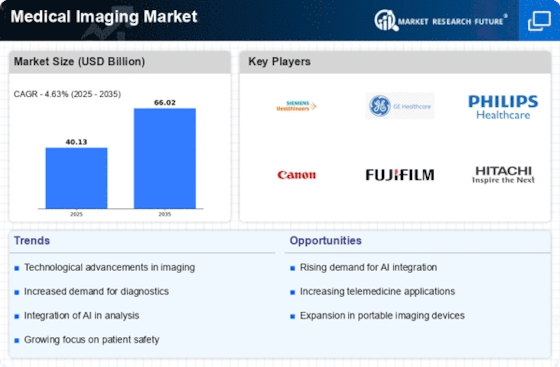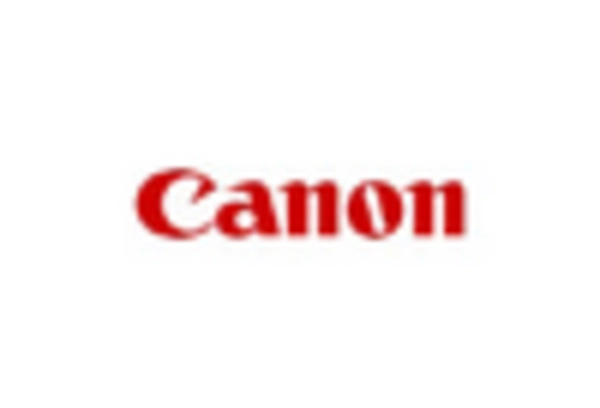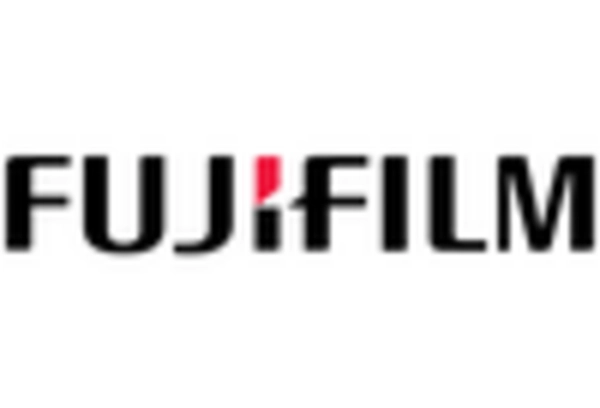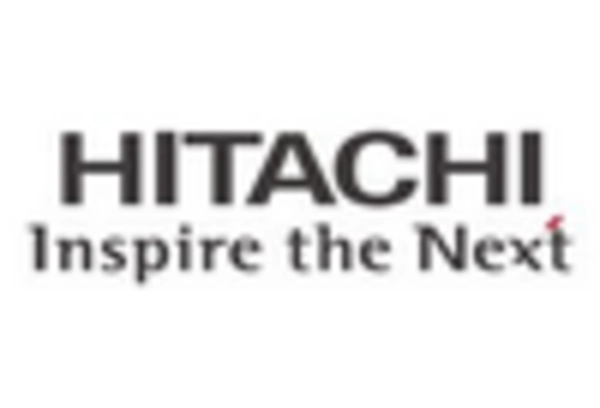MRI
CT Scan
Ultrasound
X-Ray
Nuclear Imaging
Hospitals
Diagnostic Imaging Centers
Research Institutes
Outpatient Facilities
Radiography
Tomography
Magnetic Resonance Imaging
Ultrasonography
Consumables
Equipment
Software
North America
Europe
South America
Asia Pacific
Middle East and Africa
North America Outlook (USD Billion, 2019-2035)
North America Medical Imaging Market by Imaging Technique Type
MRI
CT Scan
Ultrasound
X-Ray
Nuclear Imaging
North America Medical Imaging Market by End Use Type
Hospitals
Diagnostic Imaging Centers
Research Institutes
Outpatient Facilities
North America Medical Imaging Market by Modality Type
Radiography
Tomography
Magnetic Resonance Imaging
Ultrasonography
North America Medical Imaging Market by Product Type
Consumables
Equipment
Software
North America Medical Imaging Market by Regional Type
US
Canada
US Outlook (USD Billion, 2019-2035)
US Medical Imaging Market by Imaging Technique Type
MRI
CT Scan
Ultrasound
X-Ray
Nuclear Imaging
US Medical Imaging Market by End Use Type
Hospitals
Diagnostic Imaging Centers
Research Institutes
Outpatient Facilities
US Medical Imaging Market by Modality Type
Radiography
Tomography
Magnetic Resonance Imaging
Ultrasonography
US Medical Imaging Market by Product Type
Consumables
Equipment
Software
CANADA Outlook (USD Billion, 2019-2035)
CANADA Medical Imaging Market by Imaging Technique Type
MRI
CT Scan
Ultrasound
X-Ray
Nuclear Imaging
CANADA Medical Imaging Market by End Use Type
Hospitals
Diagnostic Imaging Centers
Research Institutes
Outpatient Facilities
CANADA Medical Imaging Market by Modality Type
Radiography
Tomography
Magnetic Resonance Imaging
Ultrasonography
CANADA Medical Imaging Market by Product Type
Consumables
Equipment
Software
Europe Outlook (USD Billion, 2019-2035)
Europe Medical Imaging Market by Imaging Technique Type
MRI
CT Scan
Ultrasound
X-Ray
Nuclear Imaging
Europe Medical Imaging Market by End Use Type
Hospitals
Diagnostic Imaging Centers
Research Institutes
Outpatient Facilities
Europe Medical Imaging Market by Modality Type
Radiography
Tomography
Magnetic Resonance Imaging
Ultrasonography
Europe Medical Imaging Market by Product Type
Consumables
Equipment
Software
Europe Medical Imaging Market by Regional Type
Germany
UK
France
Russia
Italy
Spain
Rest of Europe
GERMANY Outlook (USD Billion, 2019-2035)
GERMANY Medical Imaging Market by Imaging Technique Type
MRI
CT Scan
Ultrasound
X-Ray
Nuclear Imaging
GERMANY Medical Imaging Market by End Use Type
Hospitals
Diagnostic Imaging Centers
Research Institutes
Outpatient Facilities
GERMANY Medical Imaging Market by Modality Type
Radiography
Tomography
Magnetic Resonance Imaging
Ultrasonography
GERMANY Medical Imaging Market by Product Type
Consumables
Equipment
Software
UK Outlook (USD Billion, 2019-2035)
UK Medical Imaging Market by Imaging Technique Type
MRI
CT Scan
Ultrasound
X-Ray
Nuclear Imaging
UK Medical Imaging Market by End Use Type
Hospitals
Diagnostic Imaging Centers
Research Institutes
Outpatient Facilities
UK Medical Imaging Market by Modality Type
Radiography
Tomography
Magnetic Resonance Imaging
Ultrasonography
UK Medical Imaging Market by Product Type
Consumables
Equipment
Software
FRANCE Outlook (USD Billion, 2019-2035)
FRANCE Medical Imaging Market by Imaging Technique Type
MRI
CT Scan
Ultrasound
X-Ray
Nuclear Imaging
FRANCE Medical Imaging Market by End Use Type
Hospitals
Diagnostic Imaging Centers
Research Institutes
Outpatient Facilities
FRANCE Medical Imaging Market by Modality Type
Radiography
Tomography
Magnetic Resonance Imaging
Ultrasonography
FRANCE Medical Imaging Market by Product Type
Consumables
Equipment
Software
RUSSIA Outlook (USD Billion, 2019-2035)
RUSSIA Medical Imaging Market by Imaging Technique Type
MRI
CT Scan
Ultrasound
X-Ray
Nuclear Imaging
RUSSIA Medical Imaging Market by End Use Type
Hospitals
Diagnostic Imaging Centers
Research Institutes
Outpatient Facilities
RUSSIA Medical Imaging Market by Modality Type
Radiography
Tomography
Magnetic Resonance Imaging
Ultrasonography
RUSSIA Medical Imaging Market by Product Type
Consumables
Equipment
Software
ITALY Outlook (USD Billion, 2019-2035)
ITALY Medical Imaging Market by Imaging Technique Type
MRI
CT Scan
Ultrasound
X-Ray
Nuclear Imaging
ITALY Medical Imaging Market by End Use Type
Hospitals
Diagnostic Imaging Centers
Research Institutes
Outpatient Facilities
ITALY Medical Imaging Market by Modality Type
Radiography
Tomography
Magnetic Resonance Imaging
Ultrasonography
ITALY Medical Imaging Market by Product Type
Consumables
Equipment
Software
SPAIN Outlook (USD Billion, 2019-2035)
SPAIN Medical Imaging Market by Imaging Technique Type
MRI
CT Scan
Ultrasound
X-Ray
Nuclear Imaging
SPAIN Medical Imaging Market by End Use Type
Hospitals
Diagnostic Imaging Centers
Research Institutes
Outpatient Facilities
SPAIN Medical Imaging Market by Modality Type
Radiography
Tomography
Magnetic Resonance Imaging
Ultrasonography
SPAIN Medical Imaging Market by Product Type
Consumables
Equipment
Software
REST OF EUROPE Outlook (USD Billion, 2019-2035)
REST OF EUROPE Medical Imaging Market by Imaging Technique Type
MRI
CT Scan
Ultrasound
X-Ray
Nuclear Imaging
REST OF EUROPE Medical Imaging Market by End Use Type
Hospitals
Diagnostic Imaging Centers
Research Institutes
Outpatient Facilities
REST OF EUROPE Medical Imaging Market by Modality Type
Radiography
Tomography
Magnetic Resonance Imaging
Ultrasonography
REST OF EUROPE Medical Imaging Market by Product Type
Consumables
Equipment
Software
APAC Outlook (USD Billion, 2019-2035)
APAC Medical Imaging Market by Imaging Technique Type
MRI
CT Scan
Ultrasound
X-Ray
Nuclear Imaging
APAC Medical Imaging Market by End Use Type
Hospitals
Diagnostic Imaging Centers
Research Institutes
Outpatient Facilities
APAC Medical Imaging Market by Modality Type
Radiography
Tomography
Magnetic Resonance Imaging
Ultrasonography
APAC Medical Imaging Market by Product Type
Consumables
Equipment
Software
APAC Medical Imaging Market by Regional Type
China
India
Japan
South Korea
Malaysia
Thailand
Indonesia
Rest of APAC
CHINA Outlook (USD Billion, 2019-2035)
CHINA Medical Imaging Market by Imaging Technique Type
MRI
CT Scan
Ultrasound
X-Ray
Nuclear Imaging
CHINA Medical Imaging Market by End Use Type
Hospitals
Diagnostic Imaging Centers
Research Institutes
Outpatient Facilities
CHINA Medical Imaging Market by Modality Type
Radiography
Tomography
Magnetic Resonance Imaging
Ultrasonography
CHINA Medical Imaging Market by Product Type
Consumables
Equipment
Software
INDIA Outlook (USD Billion, 2019-2035)
INDIA Medical Imaging Market by Imaging Technique Type
MRI
CT Scan
Ultrasound
X-Ray
Nuclear Imaging
INDIA Medical Imaging Market by End Use Type
Hospitals
Diagnostic Imaging Centers
Research Institutes
Outpatient Facilities
INDIA Medical Imaging Market by Modality Type
Radiography
Tomography
Magnetic Resonance Imaging
Ultrasonography
INDIA Medical Imaging Market by Product Type
Consumables
Equipment
Software
JAPAN Outlook (USD Billion, 2019-2035)
JAPAN Medical Imaging Market by Imaging Technique Type
MRI
CT Scan
Ultrasound
X-Ray
Nuclear Imaging
JAPAN Medical Imaging Market by End Use Type
Hospitals
Diagnostic Imaging Centers
Research Institutes
Outpatient Facilities
JAPAN Medical Imaging Market by Modality Type
Radiography
Tomography
Magnetic Resonance Imaging
Ultrasonography
JAPAN Medical Imaging Market by Product Type
Consumables
Equipment
Software
SOUTH KOREA Outlook (USD Billion, 2019-2035)
SOUTH KOREA Medical Imaging Market by Imaging Technique Type
MRI
CT Scan
Ultrasound
X-Ray
Nuclear Imaging
SOUTH KOREA Medical Imaging Market by End Use Type
Hospitals
Diagnostic Imaging Centers
Research Institutes
Outpatient Facilities
SOUTH KOREA Medical Imaging Market by Modality Type
Radiography
Tomography
Magnetic Resonance Imaging
Ultrasonography
SOUTH KOREA Medical Imaging Market by Product Type
Consumables
Equipment
Software
MALAYSIA Outlook (USD Billion, 2019-2035)
MALAYSIA Medical Imaging Market by Imaging Technique Type
MRI
CT Scan
Ultrasound
X-Ray
Nuclear Imaging
MALAYSIA Medical Imaging Market by End Use Type
Hospitals
Diagnostic Imaging Centers
Research Institutes
Outpatient Facilities
MALAYSIA Medical Imaging Market by Modality Type
Radiography
Tomography
Magnetic Resonance Imaging
Ultrasonography
MALAYSIA Medical Imaging Market by Product Type
Consumables
Equipment
Software
THAILAND Outlook (USD Billion, 2019-2035)
THAILAND Medical Imaging Market by Imaging Technique Type
MRI
CT Scan
Ultrasound
X-Ray
Nuclear Imaging
THAILAND Medical Imaging Market by End Use Type
Hospitals
Diagnostic Imaging Centers
Research Institutes
Outpatient Facilities
THAILAND Medical Imaging Market by Modality Type
Radiography
Tomography
Magnetic Resonance Imaging
Ultrasonography
THAILAND Medical Imaging Market by Product Type
Consumables
Equipment
Software
INDONESIA Outlook (USD Billion, 2019-2035)
INDONESIA Medical Imaging Market by Imaging Technique Type
MRI
CT Scan
Ultrasound
X-Ray
Nuclear Imaging
INDONESIA Medical Imaging Market by End Use Type
Hospitals
Diagnostic Imaging Centers
Research Institutes
Outpatient Facilities
INDONESIA Medical Imaging Market by Modality Type
Radiography
Tomography
Magnetic Resonance Imaging
Ultrasonography
INDONESIA Medical Imaging Market by Product Type
Consumables
Equipment
Software
REST OF APAC Outlook (USD Billion, 2019-2035)
REST OF APAC Medical Imaging Market by Imaging Technique Type
MRI
CT Scan
Ultrasound
X-Ray
Nuclear Imaging
REST OF APAC Medical Imaging Market by End Use Type
Hospitals
Diagnostic Imaging Centers
Research Institutes
Outpatient Facilities
REST OF APAC Medical Imaging Market by Modality Type
Radiography
Tomography
Magnetic Resonance Imaging
Ultrasonography
REST OF APAC Medical Imaging Market by Product Type
Consumables
Equipment
Software
South America Outlook (USD Billion, 2019-2035)
South America Medical Imaging Market by Imaging Technique Type
MRI
CT Scan
Ultrasound
X-Ray
Nuclear Imaging
South America Medical Imaging Market by End Use Type
Hospitals
Diagnostic Imaging Centers
Research Institutes
Outpatient Facilities
South America Medical Imaging Market by Modality Type
Radiography
Tomography
Magnetic Resonance Imaging
Ultrasonography
South America Medical Imaging Market by Product Type
Consumables
Equipment
Software
South America Medical Imaging Market by Regional Type
Brazil
Mexico
Argentina
Rest of South America
BRAZIL Outlook (USD Billion, 2019-2035)
BRAZIL Medical Imaging Market by Imaging Technique Type
MRI
CT Scan
Ultrasound
X-Ray
Nuclear Imaging
BRAZIL Medical Imaging Market by End Use Type
Hospitals
Diagnostic Imaging Centers
Research Institutes
Outpatient Facilities
BRAZIL Medical Imaging Market by Modality Type
Radiography
Tomography
Magnetic Resonance Imaging
Ultrasonography
BRAZIL Medical Imaging Market by Product Type
Consumables
Equipment
Software
MEXICO Outlook (USD Billion, 2019-2035)
MEXICO Medical Imaging Market by Imaging Technique Type
MRI
CT Scan
Ultrasound
X-Ray
Nuclear Imaging
MEXICO Medical Imaging Market by End Use Type
Hospitals
Diagnostic Imaging Centers
Research Institutes
Outpatient Facilities
MEXICO Medical Imaging Market by Modality Type
Radiography
Tomography
Magnetic Resonance Imaging
Ultrasonography
MEXICO Medical Imaging Market by Product Type
Consumables
Equipment
Software
ARGENTINA Outlook (USD Billion, 2019-2035)
ARGENTINA Medical Imaging Market by Imaging Technique Type
MRI
CT Scan
Ultrasound
X-Ray
Nuclear Imaging
ARGENTINA Medical Imaging Market by End Use Type
Hospitals
Diagnostic Imaging Centers
Research Institutes
Outpatient Facilities
ARGENTINA Medical Imaging Market by Modality Type
Radiography
Tomography
Magnetic Resonance Imaging
Ultrasonography
ARGENTINA Medical Imaging Market by Product Type
Consumables
Equipment
Software
REST OF SOUTH AMERICA Outlook (USD Billion, 2019-2035)
REST OF SOUTH AMERICA Medical Imaging Market by Imaging Technique Type
MRI
CT Scan
Ultrasound
X-Ray
Nuclear Imaging
REST OF SOUTH AMERICA Medical Imaging Market by End Use Type
Hospitals
Diagnostic Imaging Centers
Research Institutes
Outpatient Facilities
REST OF SOUTH AMERICA Medical Imaging Market by Modality Type
Radiography
Tomography
Magnetic Resonance Imaging
Ultrasonography
REST OF SOUTH AMERICA Medical Imaging Market by Product Type
Consumables
Equipment
Software
MEA Outlook (USD Billion, 2019-2035)
MEA Medical Imaging Market by Imaging Technique Type
MRI
CT Scan
Ultrasound
X-Ray
Nuclear Imaging
MEA Medical Imaging Market by End Use Type
Hospitals
Diagnostic Imaging Centers
Research Institutes
Outpatient Facilities
MEA Medical Imaging Market by Modality Type
Radiography
Tomography
Magnetic Resonance Imaging
Ultrasonography
MEA Medical Imaging Market by Product Type
Consumables
Equipment
Software
MEA Medical Imaging Market by Regional Type
GCC Countries
South Africa
Rest of MEA
GCC COUNTRIES Outlook (USD Billion, 2019-2035)
GCC COUNTRIES Medical Imaging Market by Imaging Technique Type
MRI
CT Scan
Ultrasound
X-Ray
Nuclear Imaging
GCC COUNTRIES Medical Imaging Market by End Use Type
Hospitals
Diagnostic Imaging Centers
Research Institutes
Outpatient Facilities
GCC COUNTRIES Medical Imaging Market by Modality Type
Radiography
Tomography
Magnetic Resonance Imaging
Ultrasonography
GCC COUNTRIES Medical Imaging Market by Product Type
Consumables
Equipment
Software
SOUTH AFRICA Outlook (USD Billion, 2019-2035)
SOUTH AFRICA Medical Imaging Market by Imaging Technique Type
MRI
CT Scan
Ultrasound
X-Ray
Nuclear Imaging
SOUTH AFRICA Medical Imaging Market by End Use Type
Hospitals
Diagnostic Imaging Centers
Research Institutes
Outpatient Facilities
SOUTH AFRICA Medical Imaging Market by Modality Type
Radiography
Tomography
Magnetic Resonance Imaging
Ultrasonography
SOUTH AFRICA Medical Imaging Market by Product Type
Consumables
Equipment
Software
REST OF MEA Outlook (USD Billion, 2019-2035)
REST OF MEA Medical Imaging Market by Imaging Technique Type
MRI
CT Scan
Ultrasound
X-Ray
Nuclear Imaging
REST OF MEA Medical Imaging Market by End Use Type
Hospitals
Diagnostic Imaging Centers
Research Institutes
Outpatient Facilities
REST OF MEA Medical Imaging Market by Modality Type
Radiography
Tomography
Magnetic Resonance Imaging
Ultrasonography
REST OF MEA Medical Imaging Market by Product Type
Consumables
Equipment
Software


















Leave a Comment